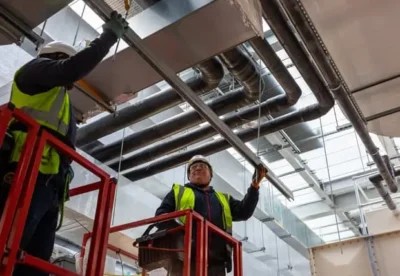That is one of the ideas in a radical review of the construction industry currently being pored over by Government ministers who commissioned it.
The Farmer Review of the UK Construction Labour Model warns the industry faces “inexorable decline” unless major changes are made.
It highlights construction’s “dysfunctional training model”, lack of innovation and collaboration and “non-existent research and development culture.”
Author and consultant Mark Farmer said the needs of construction firms and the clients who hire them are out of step.
He said: “If you buy a new car, you expect it to have been built in a factory to exacting standards, to be delivered on time, to an agreed price and to a predetermined quality.
“This needs to happen more in construction, so that the investors, developers or building owners hiring construction firms increasingly dictate the use of modern methods of delivery and invest appropriately in the skills agenda to grow this part of the industry.
“There are more similarities between manufacturing and construction than many people are led to believe and this perception needs to change, starting in the housing market”
One recommendation set out for the medium term is a “carrier bag charge” style behavioural deterrent scheme.
This would levy a tax on businesses who buy construction work in a way that doesn’t support industry innovation or skills development.
Clients could face paying a suggested levy equal to 0.5% of a scheme’s construction cost but would avoid paying this tax completely by commissioning construction in a more responsible way.
Farmer said: “The construction industry is in dire need of change.
“What is clear to me following the nine months spent conducting this review is that carrying on as we are is simply not an option.
“With digital technology advancements pushing ahead in almost every other industry and with the construction labour pool coming under serious pressure, the time has come for action.
“Unless we find some way of promoting innovation in construction and making the work less labour intensive and more attractive to new entrants, there’s a very real danger of the construction sector going into an inexorable decline over the next few years.
“I hope this review generates some debate in the sector and all involved can consider their role in safeguarding the industry’s long term health.”
Ray O’Rourke, chairman and chief executive at Laing O’Rourke, said: “Laing O’Rourke has invested heavily in innovation and continuous improvement, and therefore I welcome many of the findings and recommendations of the Farmer review.
“The report shines a light on the serious and systemic issues in UK house building and the wider construction industry, and we cannot afford to ignore them any longer.”
“There is significant scope for radical transformation through the adoption of new technologies and advanced manufacturing approaches.
“This will deliver the quality housing stock the UK urgently requires and directly address the acute skills gap that threatens our very future.
“Government, developers and deliverers need to invest collectively to achieve these shared goals and future-proof the industry.”
Ten main recommendations of the Farmer Review
1. Construction Leadership Council should have strategic oversight of the implementation of these recommendations and evolve itself appropriately to coordinate and drive the process of delivering the required industry change programme set out in this review.
2. CITB should be comprehensively reviewed and a reform programme instituted.
3. Industry, clients and government should work together leveraging CLC’s Business Modelsworking party activity, to improve relationships and increase levels of investment in R&D and innovation in construction by changing commissioning trends from traditional to pre-manufactured approaches. The housing sector (spanning all tenures) should be used as a scalable pilot programme for this more integrated approach.
4. Industry, government and clients, supported by academic expertise and leveraging CLC’s current Innovation work stream activity, should organise to deliver a comprehensive innovation programme. This should be fully aligned to market, benefits case led and generate a new shape of demand across industry, with a priority on residential construction. It should quickly define key measures of progress and report regularly against these as a check on the possible need for more radical measures. It should in turn also help shape CITB reform proposals in relation to technology and innovation grant funding initiatives.
5. A reformed CITB should look to reorganise its grant-funding model for skills and training aligned to what a future modernised industry will need. Industry bodies and professional institutions should also take a more active role in ensuring that training courses are producing talent which is appropriate for a digitally enabled world, ensuring that the right business models are evolved with appropriate contractual frameworks.
6. The government has recently reaffirmed its commitment to having a strong industrial strategy. The government should recognise the value of the construction sector and be willing to intervene by way of appropriate further education, planning and tax / employment policies to help establish and maintain appropriate skills capacity.
7. A reformed CITB or stand-alone body should be challenged and empowered to deliver a more powerful public facing story and image for the holistic ‘built environment’ process, of which construction forms part. This responsibility should include an outreach programme to schools and should position industry exemplars and the target future state rather than just ‘business as usual’.
8. Government should act to provide an ‘initiation’ stimulus to innovation in the housing sector by promoting the use of pre-manufactured solutions through policy measures. This should be prioritised either through the conditional incentivisation of institutional development and investment in the private rented sector; the promotion of more pre-manufactured social house building through registered providers; direct commissioning of pre-manufactured housing; or a combination of any of the above. It should also consider planning breaks for pre-manufactured approaches.
9. Government, as part of its housing policy planning, should work with industry to assemble and publish a comprehensive pipeline of demand in the new build housing sector, on the same lines as the National Infrastructure Pipeline, seeking to bring private developers and investors into this as far as possible to assist with longer term innovation and skills investment planning.
10. In the medium to longer term, and in particular if a voluntary approach does not achieve the step change necessary, government should consider introducing a charge on business clients of the construction industry to further influence commissioning behaviour and to supplement funding for skills and innovation at a level commensurate with the size of the industry. If such a charge is introduced, it should be set at no more than 0.5% of construction value, with a clear implementation timetable. Clients should be able to offset their contribution by demonstrating how they are contributing to industry capacity building and modernisation by directly or indirectly investing in skills development, pre-manufacturing facilities, or other forms of innovation and R&D.






 (300 x 250 px) (2).png)
















































